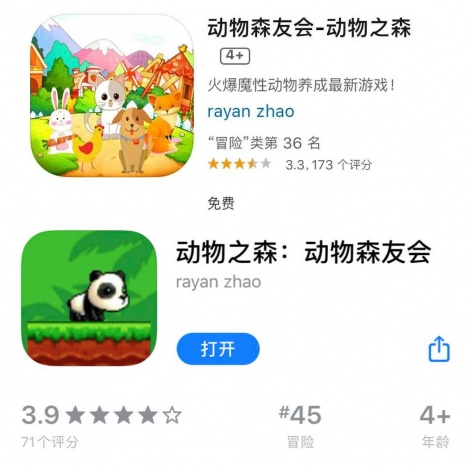It can be difficult to get the latest news from China, given how locked off it can be for the rest of the world, but we're making it a little bit easier with our new, weekly round-up of the biggest stories from the region.
We're working with Junxue Li, CEO of Beijing-based 2D art firm Sunny Painter, to bring the most interesting news from China to you, so you can stay informed of what's happening in one of the biggest markets in the world.
This week, we're looking at the growing potential of female-focused games in China, and Code Dragon Blood making waves in Japan.
Female-centric games have great potential in China
In the last two years, female-centric games have started to become the hot new trend in the Chinese market. There are 300 million female gamers in China, making up nearly half of all users.
Let's see the full picture from one highlighted example: Singing for You My Whole Life (浮生为卿歌) , a 3D role-playing game published by Paper Games, hit 80 million yuan revenue ($12 million) this March, and the figure is expected to exceed 200 million yuan ($28 million) in April judging from its revenue growth since February.
And in 2019, hit female-centric games include Shining Nikki (闪耀暖暖), a dressing game published by Paper Games, and Food Tale (食物语), a turn-based RPG published by Tencent. Their peak monthly revenue all had hit 100 million yuan ($14 million) mark.
It's obvious that women in both West and East share some common preferences. For example match-3, dressing and interactive story are favored genres, and they have an appetite for highly-polished 2D graphics.
A wave of territorial Mahjong-Poker games shutting down
Early this year, territorial Mahjong-Poker games had been harvesting alongside other mobile games under the nationwide self-quarantine situation. However it's quite unexpected that within the last couple of months, more than 10 well-performing games of this kind had announced they were shutting down. They are operated by relatively bigger companies in this sector, including Guizhou Mahjong (贵州麻将) by Tencent.
In this vast country of mid-small size cities, the territorial Mahjong-Poker games are making good money, thanks to the unique mahjong culture here. The games are mostly multipleplayer virtual rooms mode and they are quite territorial - they are often named after certain provinces, for example Sichuan Mahjong (四川麻将), and Hunan Mahjong (湖南麻将).
The games are often operated by local companies in the namesake provinces and players are mostly from the same area. And these types of games are numerous, coming up in all degrees of qualities and operated by businesses of various size. In recent years this type of games have become an investors' bonanza.
And despite the wide range of titles shutting down, the operators haven't given details in their announcements. It's speculated that it's the result of the big tide of having the gaming market in China more regulated - please refer to my last weekly report on PocketGamer.biz for more.
Beijing's mid-long term plan: to be the capital of online gaming
On April 9th, the Beijing Development and Reform Committee issued the formal mid-long term (2019-2035) cultural development plan. One of the tasks is to build Beijing as the capital of online gaming.
The details of the plan include creating a complete ecosystem of online gaming; by building centers and parks covering game development, gaming theory research, publishing and marketing sectors; to attract game industry talents and teams from around the world to Beijing; and to forge outstanding brands of esports.
And for the plan, the city will continue to support/promote the export of cultural products such as movies, games and music.
A Chinese MMO game tops Japanese Free Charts
On April 10th, an MMO role-playing game, Code Dragon Blood acscended to the top spot on both App Store and Google Play free charts in Japan. The game is developed by Loong Entertainment and published by Tencent in Japan.
There are many factors combined to make up its success. Firstly, the game is adapted from the work of a famed Japanese author; it;s a game with an anime graphic style, inviting famous Japanese voice actors and the Naruto composer to the production team; and following other successful Chinese titles' model, intense promotion on TV, YouTube and Twitter have proven essential.
The game is named Dragon Raja in the west and has also become an instant success.
Tencent's buying Huya, a leading live-streaming platform in China
Early this month, Tencent paid $262.6 million in cash to take control of Huya, a leading game centric live-streaming platform in China.
Now Tencent has closed the supply chain loop, taking in control development, publishing and broadcasting of gaming content.
And before this, Tencent already controlled Douyu, Huya's main rival in China.
Copycats of Animal Crossing appear in Chinese App Store
While Animal Crossing takes the world by storm, two copycats have appeared in Chinese App Store. They are unrelated, subpar games with the Chinese translation of "Animal Crossing" (动物森友会) as their names.
Both games are by developer Rayan Zhao, and they have done something even worse by leaving the official site of Kunpo Games, a reputed Chinese developer, as the "developer’s site”"in App Store. "Who knows this guy's contact?" Zhou Wei, the COO of Kunpo, shouted in outrage in his WeChat friend-circle.
This case reveals that the management of App Store is chaotic to some extent, calling for tightened administration by both Apple and the authorities.

















